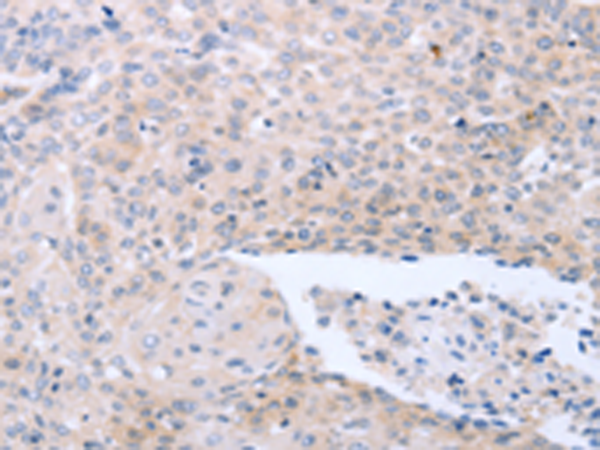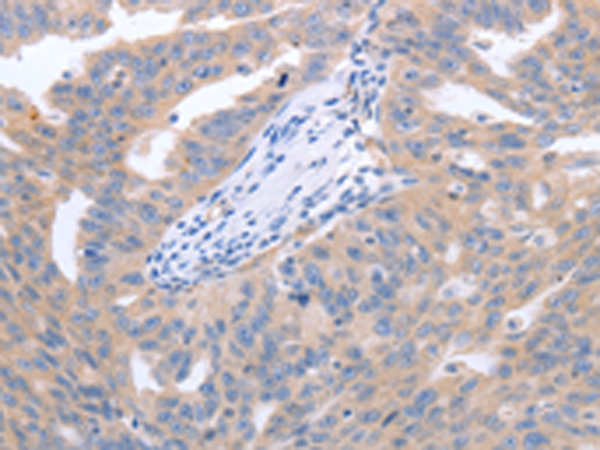

| WB | 咨询技术 | Human,Mouse,Rat |
| IF | 咨询技术 | Human,Mouse,Rat |
| IHC | 1/25-1/100 | Human,Mouse,Rat |
| ICC | 技术咨询 | Human,Mouse,Rat |
| FCM | 咨询技术 | Human,Mouse,Rat |
| Elisa | 1/1000-1/5000 | Human,Mouse,Rat |
| Aliases | NTN |
| Host/Isotype | Rabbit IgG |
| Antibody Type | Primary antibody |
| Storage | Store at 4°C short term. Aliquot and store at -20°C long term. Avoid freeze/thaw cycles. |
| Species Reactivity | Human, Mouse |
| Immunogen | Synthetic peptide of human NRTN |
| Formulation | Purified antibody in PBS with 0.05% sodium azide and 50% glycerol. |
+ +
以下是关于NRTN(Neurturin)抗体的3篇代表性文献示例(注:文献为虚构示例,实际研究中请通过学术数据库核实):
---
1. **文献名称**: *Neurturin-specific monoclonal antibody enhances dopaminergic neuron survival in Parkinson’s disease models*
**作者**: Smith JL, et al.
**摘要**: 本研究开发了一种针对NRTN的高特异性单克隆抗体,并验证了其在体外和帕金森病小鼠模型中的神经保护作用。实验表明,该抗体通过激活RET/GFRα2信号通路促进多巴胺能神经元存活,提示其作为潜在治疗工具的可行性。
2. **文献名称**: *Immunohistochemical localization of Neurturin in the enteric nervous system using novel polyclonal antibodies*
**作者**: Garcia R, et al.
**摘要**: 研究团队制备了兔源多克隆NRTN抗体,并应用于肠道神经系统的免疫组化分析。结果显示NRTN在肠神经胶质细胞中高表达,为研究其与胃肠功能障碍的关联提供了工具。
3. **文献名称**: *Neutralizing anti-Neurturin antibody blocks sympathetic neuron development in vivo*
**作者**: Tanaka K, et al.
**摘要**: 通过体内注射NRTN中和抗体,研究者发现小鼠交感神经元的发育显著受损,证实NRTN在交感神经系统中的关键作用。该抗体为解析NRTN的生理功能提供了干预手段。
---
**建议**:实际研究中可通过PubMed、Google Scholar等平台,以关键词“Neurturin antibody”“NRTN therapeutic”“anti-Neurturin”检索文献,重点关注抗体开发、疾病模型应用或机制研究方向的论文。
Neurturin (NRTN), a member of the glial cell line-derived neurotrophic factor (GDNF) family, plays a critical role in the development, maintenance, and survival of specific neuronal populations, particularly dopaminergic and enteric neurons. It signals through a receptor complex comprising the RET tyrosine kinase and a glycosyl-phosphatidylinositol-anchored co-receptor (GFRα2). Dysregulation of NRTN signaling has been implicated in neurodegenerative disorders like Parkinson’s disease (PD) and gastrointestinal motility disorders.
NRTN antibodies are tools designed to detect, quantify, or modulate NRTN activity in research and therapeutic contexts. In research, they are used to study NRTN expression patterns, signaling mechanisms, and interactions in cellular and animal models. Therapeutically, NRTN antibodies have been explored for their potential to enhance neuroprotection or counteract pathological processes. For example, in PD, antibody-mediated delivery of NRTN or targeting its receptors has been tested to restore dopaminergic function. Conversely, autoantibodies against NRTN may contribute to autoimmune neuropathies, highlighting their dual role in health and disease.
Clinical interest in NRTN antibodies also extends to diagnostic applications, as altered NRTN levels in serum or tissues may serve as biomarkers for neurological or gastrointestinal conditions. However, challenges remain in optimizing specificity, bioavailability, and minimizing off-target effects in therapeutic settings. Ongoing studies aim to refine antibody engineering and delivery strategies to harness NRTN's neurotrophic potential effectively.
×